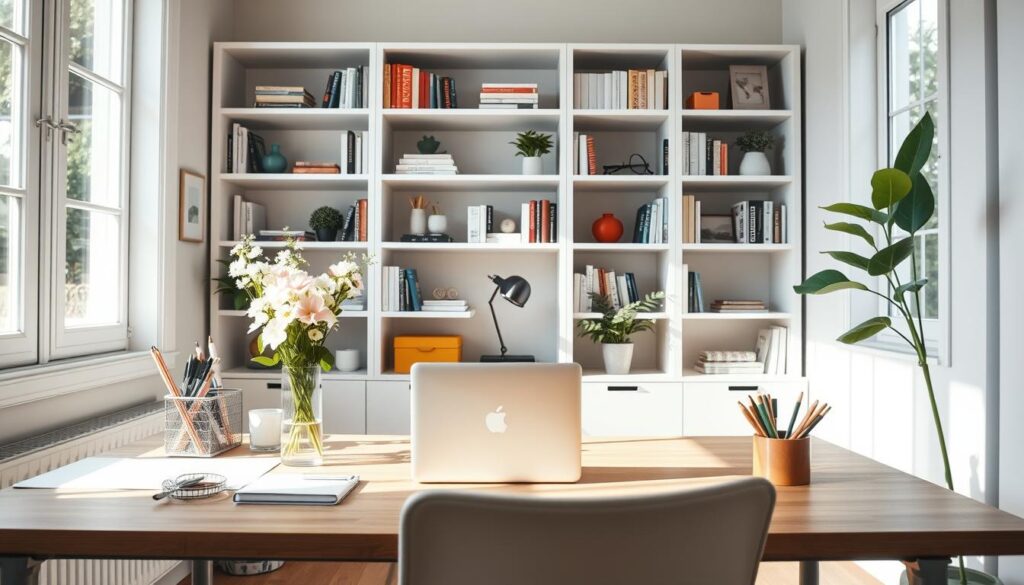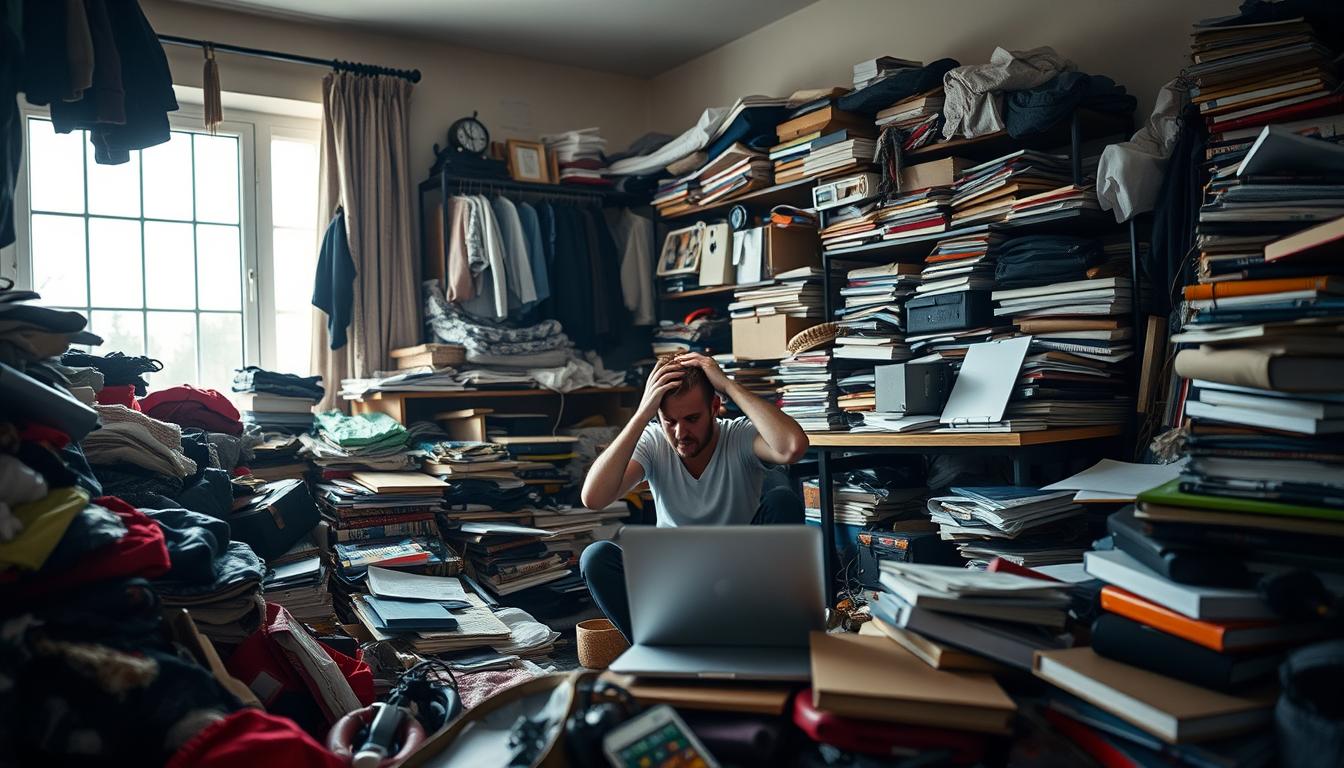Decluttering Tips for Hoarders: Do you feel overwhelmed by clutter and find it hard to let go of things? You’re not alone. Hoarding disorder affects millions, making everyday life tough.
Reclaiming your space can feel liberating, boosting your mental and physical health. Good decluttering strategies can guide you through this process.
Start with small steps and don’t hesitate to ask for help when you need it. This way, you can begin to beat hoarding disorder. You’ll create a more organized and peaceful home.
Contents
- 1 Understanding Hoarding Behavior
- 2 Getting Started: Mental Preparation
- 3 Creating a Personalized Decluttering Plan
- 4 Effective Decluttering Tips for Hoarders
- 5 Decision-Making Strategies
- 6 Organizing What Remains
- 7 Maintaining Your Progress
- 8 Conclusion: Decluttering Tips for Hoarders
- 9 FAQ
- 9.1 What is hoarding disorder, and how does it affect individuals?
- 9.2 How do I start decluttering if I’m overwhelmed by my possessions?
- 9.3 What are some effective decluttering tips for hoarders?
- 9.4 How do I make decisions about what to keep and what to discard?
- 9.5 How can I maintain my progress after decluttering?
- 9.6 What are some common challenges people face when decluttering, and how can I overcome them?
Understanding Hoarding Behavior
Hoarding disorder is a real mental health issue. It’s not just about clutter; it’s a complex problem that affects many areas of life. People with hoarding disorder struggle to throw away items. This leads to messy homes and a lot of stress.
The reasons for hoarding are varied. Genetics, environment, and psychology all play a part. Studies show that hoarders might have different brain chemistry and have faced traumatic events.
To tackle hoarding, we need to understand it well. Recognizing the depth of hoarding disorder and its effects on mental health is key. This way, we can start to solve the underlying problems.
It’s important to treat hoarding with kindness and understanding. Seeing it as a serious mental health issue is crucial. It needs professional help to be overcome.
Getting Started: Mental Preparation
Starting your decluttering journey requires mental preparation. It’s not just about getting rid of stuff. It’s also about letting go of emotional ties to items. You need a decluttering mindset to release items that don’t add value to your life.
It’s tough to let go of things you’re emotionally attached to. Recognize the feelings tied to certain items. Then, decide if these feelings are worth keeping the item. Ask yourself, “Does this item make me happy or serve a purpose?” This question helps you make choices that match your goals.
Setting realistic expectations is part of mental preparation. Decluttering takes time, effort, and patience. Knowing this helps you avoid getting frustrated and stay motivated. Start with one area at a time and celebrate your wins. This way, you build the strength needed to overcome emotional attachment and reach your decluttering goals.
Creating a Personalized Decluttering Plan
A personalized decluttering plan is key for those who want to clear their space. First, you need to look at your clutter and find out where it’s worst.
Start by listing the cluttered rooms or areas in your home. Then, sort them by how important and urgent they are. For instance, begin with rooms you use a lot or those that are unsafe.
After that, set achievable goals for each area. Break big tasks into smaller ones. This makes it easier to stay focused and keep going.
Think about making a schedule to keep you on track. You could clean for a set time each day or pick certain days for decluttering.
By following these steps, you can make a decluttering plan that fits you. It will help you reach your goals.
Effective Decluttering Tips for Hoarders
Decluttering for hoarders is more than just getting rid of stuff. It’s about changing how you see your belongings. For hoarders, it’s hard to let go because of the emotional bond with items. But, with the right methods, you can take back your space and feel less stressed.
One key decluttering tip is to start small. Pick one area or type of item to begin with. This makes the task feel less daunting. For hoarders, deciding what to keep should be based on how it affects your life now.
Creating Digital Memory Books
For hoarders, giving up sentimental items is tough. A smart idea is to make digital memory books. Take photos of special items and put them in a digital album or scrapbook. You can write captions or stories, keeping memories alive without the physical burden.
Digitizing your memories lets you clear out physical clutter while keeping emotional ties. This method not only helps declutter but also offers a special way to hold onto cherished moments.
Decluttering is a journey, and it’s fine to take it slow. By using these decluttering tips and digital memory books, you can make big strides. You’ll reclaim your space and enhance your life’s quality.
Decision-Making Strategies
When you declutter, you’ll face tough choices about your stuff. Making decisions is key in decluttering. Having a clear plan helps you know what to keep and what to let go.
Start by thinking about each item’s purpose. Ask if it’s useful or brings you joy. If not, it might be time to let it go. Try sorting items into keep, donate, sell, and discard piles. This makes decisions easier.
When deciding, ask yourself questions like “When was the last time I used this?” or “Does it hold sentimental value?” Being honest with yourself helps make these choices.
Using these strategies, you’ll find decluttering easier. The goal is to have only meaningful or useful items. This makes your space more comfortable and organized.
Organizing What Remains
Organizing what you’ve kept is key to keeping your space tidy. After you’ve decluttered, you need a system to keep things organized and accessible.
Begin by grouping your items, like clothes, books, and kitchen stuff. This helps you find the right storage for each group. For example, use bins for seasonal items or file organizers for documents.

To keep your space clutter-free, set up cleaning and organizing routines. These organizing tips will help you enjoy your tidy space for a long time. [Decluttering Tips for Hoarders]
Good organization is essential for maintaining organization. Label your storage and put often-used items where you can easily find them. This saves time and reduces stress.
See Also: Ideal Foods for Meal Prepping
Maintaining Your Progress
After decluttering, the real challenge starts: keeping up the progress you’ve made. To keep your space organized, it’s key to develop habits that support your decluttering efforts.
One effective strategy is to establish a regular cleaning schedule. Set aside time each week to maintain your space. This could be tidying up living areas, organizing clutter-prone zones, or making sure everything is in its place.
Another crucial habit is to adopt a “one in, one out” policy. For every new item you bring into your home, an old one must be removed or donated. This helps keep a balance and prevents clutter from building up again.
Additionally, creating a home for each item can significantly aid in maintaining clutter control. Make sure everything has a designated place. This makes it easier to find things when needed and prevents clutter from accumulating.
By incorporating these habits into your daily routine, you’ll be better equipped to maintain your decluttering progress. You’ll enjoy a clutter-free life. [Decluttering Tips for Hoarders]
Conclusion: Decluttering Tips for Hoarders
As you finish your decluttering journey, you’ll feel the freedom of a clutter-free life. Letting go of things you don’t need and organizing what’s left makes your space reflect your values. It supports a minimalist lifestyle.
Reclaiming your space is more than just getting rid of stuff. It’s about creating a place that helps you feel good and be productive. Keeping your space organized will improve your mental and emotional health too.
Now, it’s time to start your own decluttering journey. Use the tips and strategies from this article to transform your space. Embracing a minimalist lifestyle will help you face life’s challenges and live a more organized, clutter-free life.
FAQ
What is hoarding disorder, and how does it affect individuals?
Hoarding disorder makes it hard for people to get rid of things. This leads to messy homes and a lot of stress. It can hurt relationships and make daily life tough.
How do I start decluttering if I’m overwhelmed by my possessions?
First, get ready mentally for decluttering. Then, make a plan that fits your needs and situation. [Decluttering Tips for Hoarders]
What are some effective decluttering tips for hoarders?
Think about making digital memory books for special items. Start with one area at a time to stay focused. [Decluttering Tips for Hoarders]
How do I make decisions about what to keep and what to discard?
Look at each item’s usefulness, sentimental value, and memories. This helps you decide what to keep or throw away. [Decluttering Tips for Hoarders]
How can I maintain my progress after decluttering?
Keep your space tidy by tidying up regularly. Use systems to organize things. Be careful about what you buy. [Decluttering Tips for Hoarders]
What are some common challenges people face when decluttering, and how can I overcome them?
Feeling too attached to things and getting overwhelmed are common hurdles. Overcome them by getting support, taking breaks, and celebrating small wins.

Hi, I’m Waverly Moon, creator of TipsToFeelBetter.com. This blog is for practical moms and family-focused women seeking simple, realistic ways to improve daily life. From home routines to self-care, I share tips that truly work—because life doesn’t need to be perfect to feel better. Let’s make everyday moments a little easier, together.

